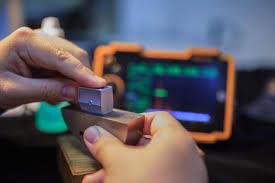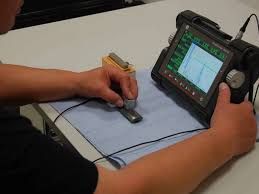Nondestructive testing (NDT) compliance is a critical element in ensuring the safety and reliability of various structures and equipment. In Egypt, strict adherence to NDT standards is essential for the efficient operation of industries such as oil and gas, construction, and manufacturing. This article discusses the importance of nondestructive testing compliance in Egypt and the measures that can be taken to ensure that NDT regulations are followed industrial non destructive testing rigorously.
Ensuring nondestructive testing compliance in Egypt involves implementing and enforcing standards and regulations set by ndt destructive testing the Egyptian government and international organizations. This includes conducting regular inspections and audits of testing facilities, ensuring proper training and certification of NDT personnel, and monitoring the quality and accuracy of test results. Additionally, maintaining proper documentation and record-keeping is crucial to demonstrate compliance with NDT requirements. Nondestructive testing plays a critical role in ensuring the safety and reliability of infrastructure, manufacturing, and industrial operations, making compliance essential to prevent accidents and ensure public safety.
Understanding Nondestructive Testing Compliance in Egypt

Understanding Nondestructive Testing (NDT) Compliance in Egypt involves familiarizing oneself with the regulations and standards set by the Egyptian Organization for Standardization and Quality ultrasonic testing ndt (EOS). This includes understanding the specific requirements for conducting NDT in various industries, such as oil and gas, construction, and manufacturing. It is also important to be aware of the certification and training requirements for NDT personnel in Egypt, as well as any updates or changes to compliance regulations. Additionally, familiarizing oneself with the cultural and business practices in Egypt can help ensure smooth communication and cooperation with local authorities and organizations when it comes to NDT compliance.
The Importance of Nondestructive Testing Compliance in Egyptian Industries

Nondestructive testing (NDT) compliance is crucial in Egyptian industries to ensure the safety, quality, and reliability of various equipment, structures, and materials. NDT plays a vital role in identifying defects, flaws, and imperfections without causing any damage to the tested object. This is particularly important in industries such as oil and gas, construction, aerospace, and manufacturing, where the integrity of materials and components is essential for operational safety. Nondestructive testing compliance also helps in meeting regulatory standards and international codes, which is necessary for exporting products to foreign markets. Additionally, adherence to NDT compliance ensures cost-effectiveness by reducing the risk of operational failures, minimizing downtime, and extending the lifespan of assets. In Egypt, the implementation of NDT compliance is critical for enhancing industrial performance, reputation, and competitiveness in the global market.
Nondestructive Testing Standards and Regulations in Egypt

Nondestructive testing (NDT) standards and regulations in Egypt are governed by the Egyptian Organization for Standardization and Quality (EOS). The EOS is responsible for establishing and maintaining national standards for NDT methods and procedures to ensure the safety and quality of various industries, including construction, aerospace, and manufacturing. The organization adopts and adapts international standards such as those provided by the American Society for Testing and Materials (ASTM), the International Organization for Standardization (ISO), and the European Committee for Standardization (CEN). These standards cover a wide range of NDT methods, including ultrasonic testing, radiographic testing, magnetic particle testing, and visual testing, among others. In addition to adhering to international standards, companies and organizations in Egypt are also required to comply with local regulations and requirements set forth by the Ministry of Industry and Trade, the Ministry of Defense, and other relevant authorities. These regulations may include specific certification and qualification requirements for NDT personnel, as well as periodic inspections and audits to ensure compliance with established standards and regulations. Overall, the enforcement of NDT standards and regulations in Egypt is vital for maintaining the integrity and reliability of critical infrastructure and industrial facilities, as well as for promoting public safety and environmental protection.
Ensuring Nondestructive Testing Compliance in Egypt: Challenges and Solutions
Ensuring Nondestructive Testing (NDT) compliance in Egypt poses several challenges, including inconsistent regulations, lack of qualified personnel, and limited resources for training and equipment. Additionally, there is a need for standardization and accreditation of NDT procedures to ensure reliability and quality of testing. One solution to address these challenges is to establish a regulatory framework that outlines clear guidelines and requirements for NDT practices. This framework should also include certification programs for NDT technicians to ensure proficiency in conducting tests. Furthermore, investment in training and education in NDT techniques and technologies can help build a skilled workforce and ensure the proper implementation of testing procedures. Collaboration with international organizations and industry partners can also provide access to advanced equipment and expertise. Implementing a system for regular audits and inspections can help monitor compliance with NDT regulations and identify areas for improvement. This can enhance the overall quality and reliability of NDT testing in Egypt, ultimately contributing to the safety and integrity of engineering structures and industrial equipment.
The Future of Nondestructive Testing Compliance in Egypt
The future of nondestructive testing compliance in Egypt is expected to see significant growth and development. The country has been making efforts to align with international standards and best practices in nondestructive testing to ensure the safety and reliability of its infrastructure and industrial facilities. There has been an increasing awareness about the importance of nondestructive testing in various sectors such as oil and gas, construction, and manufacturing. The Egyptian government has been actively promoting the adoption of nondestructive testing techniques through regulatory frameworks and collaborations with international organizations. This includes training programs for professionals in the field and the establishment of certification requirements for nondestructive testing personnel. With the continued investment in infrastructure projects and the expansion of the industrial sector in Egypt, the demand for nondestructive testing services is likely to grow. This presents opportunities for nondestructive testing companies and professionals to contribute to the country's development while ensuring compliance with quality and safety standards. Overall, the future of nondestructive testing compliance in Egypt is promising, and the continued focus on improving standards and practices will be essential for the country's long-term growth and sustainability.
Implications of Nondestructive Testing Compliance for Egyptian Infrastructure
Nondestructive testing compliance is crucial for the integrity and safety of Egyptian infrastructure. Noncompliance with these testing standards can lead to structural vulnerabilities, potentially jeopardizing the safety and functionality of essential infrastructure such as bridges, buildings, and pipelines. Additionally, failure to meet NDT compliance can result in costly repairs, decreased lifespan of infrastructure, and potential legal ramifications. By prioritizing NDT compliance, the Egyptian government and relevant stakeholders can ensure the long-term safety, reliability, and functionality of the country's infrastructure, ultimately benefiting public welfare and economic development.
Advancing Nondestructive Testing Compliance in Egypt: Opportunities and Innovations
Advancing Nondestructive Testing Compliance in Egypt: Opportunities and Innovations aims to address the opportunities and challenges related to nondestructive testing (NDT) compliance in Egypt. This initiative seeks to promote the adoption and implementation of innovative NDT technologies and methods in various industries, including oil and gas, aerospace, construction, and manufacturing. The project involves collaboration between government agencies, regulatory bodies, industry associations, and NDT professionals to develop and implement best practices, standards, and guidelines for NDT compliance. It also focuses on training and capacity building to enhance the skills and knowledge of NDT practitioners in Egypt. Innovations in NDT, such as advanced imaging techniques, remote monitoring systems, and digital inspection tools, are being showcased and promoted as part of this initiative. These innovations are expected to improve the accuracy, efficiency, and safety of NDT processes, thereby enhancing compliance and reducing the risk of structural failures and equipment malfunctions. Overall, this initiative presents an opportunity for Egypt to strengthen its NDT capabilities, improve regulatory compliance, and enhance the quality and reliability of its industrial infrastructure.
In conclusion, ensuring nondestructive testing compliance in Egypt is crucial for maintaining the safety and integrity of various industries, including construction, manufacturing, and aerospace. By adhering to international standards and regulations, companies can effectively identify and address potential defects in their equipment and structures, ultimately preventing costly accidents and downtime. It is imperative for organizations in Egypt to prioritize nondestructive testing compliance to uphold their commitment to quality and safety.
industrial non destructive testing